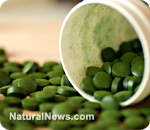God, Hope & Helping Others
Comment
© 2024 Created by Glenn Canady.
Powered by
![]()
God, Hope & Helping Others
Study: Antioxidant blend protects against radioactive DNA damage

It is the Ministry of NSearch that all inherit the Kingdom of God
But if you are led by the Spirit, you are not under the law....
Now the works of the flesh are evident,
which are adultery fornication, uncleanness, lewdness,
idolatry, sorcery, hatred, contentions, jealousies,
outbursts of wrath, selfish ambitions, dissensions, heresies, envy,
murders, drunkenness, revelries, and the like;
of which I (Paul the Apostle) tell you beforehand,
just as I also told you in time past, that those who
practice such things will not inherit the kingdom of God.
But the fruit of the Spirit is love, joy, peace, long-suffering,
kindness, goodness, faithfulness, gentleness, self-control,
against such there is no law. Those who are Christ's
have crucified the flesh with its passions and desires.
If we live in the Spirit, let us also walk in the Spirit.
Let us not become conceited, provoking one another,
envying one another.
Galatians 5:18-26
{Sorcery: "Pharmakia;" Primarily mentioned as one of the "works of the flesh." In "sorcery" the use of drugs. Blue Letter Bible. Galatians 5:20}
Russian Device Treats Diseases!
Get all the details on the Russian device and much more in my FREE ebook when you Sign Up for Project Nsearch and go to the Bonuses page when logged in! Email glenn@nsearch.com if you have problems.
© 2024 Created by Glenn Canady.
Powered by
![]()
You need to be a member of Project Nsearch to add comments!
Join Project Nsearch